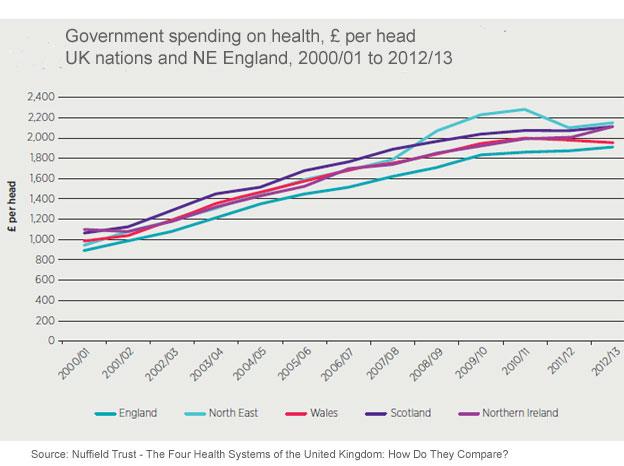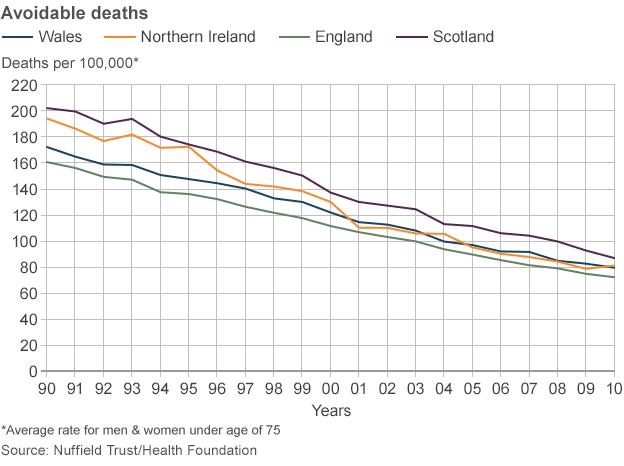Measuring devolution: Is the NHS fit for the future?
- Published

The NHS in Wales is facing an unprecedented squeeze
The performance of the Welsh NHS is never far from the headlines. It takes up almost half the Welsh government's annual budget, and those who manage and deliver the service are under scrutiny like never before.
But how has the Welsh NHS evolved since the Welsh government took control of it in 1999?
The first decade of devolution was characterised by an unprecedented increase in health spending - but was all that money spent wisely? Some argue the period of plenty was a missed opportunity to deal with some fundamental problems facing the NHS.
And now at a time when health spending is being squeezed like never before, are politicians and the NHS grasping the nettle in terms of its future?
Throughout this week BBC Wales is looking at 15 years since devolution - throwing a spotlight on different aspects of it each day.
BBC Wales health correspondent Owain Clarke gives his assessment of the health system.

What's the story of the past 15 years?
Is the NHS better since devolution and has the Welsh government delivered on its promises?
Money is certainly central to it. In the first decade of devolution, the cash flowed in. A decision at Westminster to increase funding so that health spending came up to the European average meant the new Welsh government could also invest significant sums early on.
In fact, spending per head on health doubled in Wales, in just a decade between 2000 and 2010. But since the financial crisis, unprecedented growth has been replaced by an unprecedented squeeze.
The Welsh government has cut the health budget since the last election, meaning health boards have had to struggle to reduce their spending by hundreds of millions of pounds.
Last autumn in its budget, the Welsh government did allocate some extra funding but there's little doubt belts will be extremely tight for many years to come.


So where did all the money go in the first decade?
More doctors and nurses were employed and salaries rose. In fact, the total number of NHS staff in Wales staff increased by a quarter during that period.
But there are differing views as to whether or not all that money was spent wisely.
Welsh health minister Mark Drakeford looks back at 15 years but Welsh Lib Dem leader Kirsty Williams questions how the money has been spent

What about the Welsh government's first health strategy?
During the boom in 2005 the Welsh government published its first 10 year vision for the health service, external. It was called Designed for Life. It promised and delivered free prescriptions and an older people's commissioner. But some of the targets it set out for the health service on waiting times, ambulance response times, access to diagnostic tests still aren't being met.
But Designed For Life also promised to redesign the whole of the Welsh NHS and to centralise some specialist care which it argued was spread too thinly and move other types of care into communities. It warned if change didn't happen families and communities would be failed. A decade later and change has proved to be as slow as it has been controversial.
One theory is all the money early on allowed politicians to buy time, to avoid grasping the nettle and making some tough decisions on reorganising the health service.
No such luxury exists today.
Ex-health minister Dr Brian Gibbons and shadow health minister Darren Millar AM on why change has been slow

What about all that "clear red water" we used to hear so much about?
Certainly in health the Welsh Labour government did pursue some priorities that were different to the Labour government in Westminster.
While in England there was a focus on patient choice and competition between health organisations, the Welsh government set about dismantling the NHS's internal market, mirroring decisions made in Scotland. It culminated in the formation of seven large Welsh health boards in 2009 which are responsible for pretty much all aspects of healthcare in their localities. But according to some, the jury's still out as to what extent the structure has delivered for patients.

But how safe is the Welsh NHS?
Care standards in the Welsh NHS are under the spotlight like never before - after several concerns emerged about poor care. David Cameron in his speech to the Welsh Conservative conference suggested the Welsh NHS's problems meant that Offa's Dyke was becoming "the dividing line between life and death".
Welsh Labour hit back claiming the prime minister was seeking to divert attention from huge problems in England. Between now and the next general election we're likely to see many more of these political rows.

What do the public think?
Like the politicians, the public also have mixed views. The Welsh government's National Survey of Wales suggested that over 90% of the Welsh public are satisfied by their experiences of GPs and hospitals. Our BBC Wales poll suggests that less than a quarter believe the NHS has improved since devolution.

So what are the big issues looking forward?
The Welsh NHS is not alone in facing a number of big challenges. How to deal with more demand and greater numbers of elderly patients with complicated needs, for example at a time when medicine is becoming increasingly specialised and expensive.
But against the background of an unprecedented squeeze on its finances, the Welsh health minister, and others, suggest the time might be right for a public debate about what we expect from the NHS to deliver in the 21st Century.

Has devolution delivered?
It depends who you ask. Some argue the Welsh NHS is now is in a much stronger position than it was in 1999; others claim the past 15 years is characterised by many missed opportunities. But a recent influential and independent study , externalcame to the conclusion that there was no clear evidence that NHS Wales was "lagging behind" any other part of the UK.
In fact, it demonstrated that NHS performance in the four countries on important measures of quality e.g. avoidable death rates - had remained broadly similar over two decades, despite big policy differences post-devolution.

Some are asking whether that means the NHS in reality is too big and complex for any politician to properly control.
Professor Marcus Longley says there are difficulties for both politicians and NHS bosses
What's clear is with health accounting for almost half the Welsh Government's budget, it's stewardship of the NHS will continue to come under the spotlight.
But like like elsewhere in the UK, when it comes to running a health service in the face of ever increasing demand, it seems there are few easy answers.